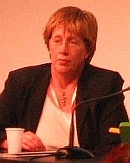Did you know that the One Laptop Per Child leadership believes that the OLPC laptop (CM1, maybe) is:
"not a cost reduced version of today's laptop, it's an entirely new approach to laptops"?
In her interview with BBC News' Digital Planet, One Laptop Per Child, Chief Technical Officer, Mary Lou Jepsen said that and more. In fact she said:
"We're redesigning the entire architecture, hardware, software, display, from the ground up, and we're coming up with some remarkable inventions and innovations"And she's right. In hardware, if they reach production-level status, the dual-mode display will be a technological leap in itself and the mesh networks will change wireless implementations worldwide. Ms. Jepsen claims the laptop will have 2-3 times the range of conventional laptop wireless antennas with its rabbit-ear design alone.
In software, Mary Lou Jepsen's comments are music to my ears:
To enhance performance and reliability, while containing costs wherever possible, we've made this an Open Source machine. Its unburdened by the bloat of feature-itis that is responsible for most of the clumsy, unreliable, and expensive modern laptops today"Amen, sister! Let us preach the gospel of FOSS, converting heathens like Sonia Arrison of Pacific Research Institute to the righteousness of our cause.
But what about "pedagogically suspect" naysayers like Education Secretary Sudeep Banerjee? What might be the real India rejection backstory? Ms. Jepsen offers this classic understatement in reference to countries with over a billion people, China and India:
"The mechanism for decisions are much more complex"Ah, indeed they are. Unlike, say Thailand, India has its own long history and deep skill set working with technology in the developing world context. Much more than Nicholas Negroponte even.
But soon we'll find out if One Laptop Per Child has its act together on the relatively easier technology side. Mary Lou Jepsen confirmed that limited production will start in the fall and mass production will be in spring 2007, so my hopes of buying a OLPC laptop by Christmas is still alive.
BBC News' Digital Planet also interviewed Jo Twist, Institute for Public Policy Research for an objective viewpoint on the OLPC project. While she (and I) thank OLPC for returning the world to the digital divide issue and increasing competition among ICT companies to service the developing world, she countered with concerns that trouble me too.
Namely that this is a top-down approach, one where the needs and wants of local communities are not in the forefront of the design and implementation process, and by the myopic focus on the technology OLPC ignores the most successful educational tool available: well trained, motivated and supplied classroom teachers.
Click Below to listen to the original Digital Planet interview on BBC News:
KEYWORDS:
OLPC | Open Source Software | BBC News | Digital Planet | Mary Lou Jepsen | Jo Twist



